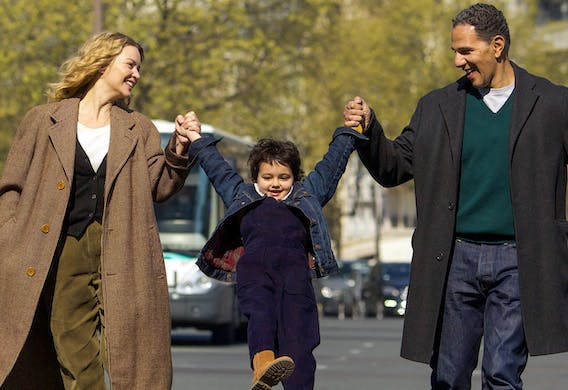Take a Trip to Paris for the Price of a Movie Ticket
Viewers of ‘Other People’s Children’ can live vicariously through the gorgeously self-possessed heroine, but one wishes that the story the filmmakers tell had more bite to it, that the picture didn’t just putter along on its French charm.

If you fancy a romantic getaway to Paris and yet wish to avoid the hassles of air travel and the constant protests occurring in the city, the new French movie “Other People’s Children” might be just the ticket. Through the movie’s single, middle-aged, gorgeously self-possessed heroine, you can live vicariously as she wears chic clothing, smokes thin cigarettes, dates a handsome divorcee — all while gliding through glistening Parisian streets.
The movie’s view of Paris and its inhabitants is so tastefully bohemian that one would be forgiven for thinking for much of the film’s runtime that you’re watching a longform commercial for some French lifestyle brand.
Rachel is the name of our beautiful protagonist and she’s a high school teacher who with a simple “tsk tsk” can stop her students from speaking and eyeing each other’s answers during an exam. At the start, we find her learning to play the guitar and, a little later, see her cool younger sister play jazzy piano during a stylish party in a commodious apartment. We’re also introduced to her ex, who is as good looking as Ali (Roschdy Zem), the new man in her life. So far, so génial.
The problem with all this is that for close to an hour, the above is pretty much the whole movie. Sure, there are hints of how Rachel would like a child, especially when she engages with Ali’s young daughter Leila, yet one would be hard-pressed to call her desire aching, or to identify a broader plot or vital impetus to the proceedings beyond the lovers’ fairly standard romance. This blandly romantic tone extends to the filmmaking, with its shots of the Eiffel Tower and overuse of Shostakovich’s “Piano Concerto No. 2 in F major, Op. 102.”
Director Rebecca Zlotowski and cinematographer George Lechaptois even frame Rachel and her boyfriend’s first argument with one of Paris’s famously wide boulevards in the background, distracting the viewer with its pointed perspective and nighttime ambience.
After this fight, and spurred on by Leila’s questioning of why Rachel has been spending so much time at Ali’s apartment, “Other People’s Children” does begin to coalesce around an idea: that a childless woman nurtures in a myriad of other ways. When her sister becomes unexpectedly pregnant, Rachel provides a shoulder to cry on (while in a quaint Parisian park). When Ali’s ex-wife is shocked by the appearance of a sickly friend, she is there to provide support. When one of her students is in danger of being expelled due to delinquency, Rachel advocates on his behalf and he is not let go.
Despite the physicality of her sang froid, Rachel beams with sincerity in her interactions with other characters, and all credit must go to actress Virginie Efira. Ms. Efira handles each of Rachel’s relationships with great poise, demonstrating that the character isn’t just emotionally smart and intellectual, but also pragmatically patient and wisely wary, particularly in her involvement with a divorced father. Some might find her character to be too understanding, yet with the wish for a child of her own seemingly the only missing piece in her lovely life, only a churlish viewer would require the character have emphatic flaws.
As director and writer, Ms. Zlotowski does occasionally add strange textures and unexpected moments, as when Rachel and her sister attend Rosh Hashanah service with their father (with military guards just outside the temple gates), or when she fades to black after certain scenes by darkly fogging the screen’s edges until only her heroine’s face is visible. Documentarian Frederick Wiseman also makes a curious appearance as Rachel’s gynecologist, whose office looks more like an author’s den than a clinical space. There’s even a sojourn to Camargue in southern France when Rachel, Ali, and Leila take a little trip.
Ms. Zlotowski is to be commended for avoiding the melodrama inherent in the scenario of a divorced man’s girlfriend taking care of his ex-wife’s child, which the Hollywood movie “Stepmom” wholeheartedly embraced. Still, one wishes that the story the filmmakers tell had more bite to it, that the film didn’t just putter along on its French charm. What Bogie once said in an iconic movie is true: “We’ll always have Paris.” At least on screen.

